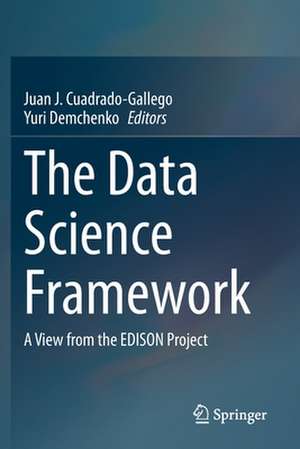The Data Science Framework: A View from the EDISON Project
Editat de Juan J. Cuadrado-Gallego, Yuri Demchenkoen Limba Engleză Paperback – 3 oct 2021
The contributed chapters are presented in sequence, each chapter picking up from the end point of the previous one. After the initial book and project overview, the chapters present the relevant data science competencies and body of knowledge, the model curriculum required to teach the required foundations, profiles of professionals in this domain, and use cases and applications. The text is supported with appendices on related process models.
The book can be used to developnew courses in data science, evaluate existing modules and courses, draft job descriptions, and plan and design efficient data-intensive research teams across scientific disciplines.
| Toate formatele și edițiile | Preț | Express |
|---|---|---|
| Paperback (1) | 1039.62 lei 6-8 săpt. | |
| Springer International Publishing – 3 oct 2021 | 1039.62 lei 6-8 săpt. | |
| Hardback (1) | 1045.91 lei 6-8 săpt. | |
| Springer International Publishing – 2 oct 2020 | 1045.91 lei 6-8 săpt. |
Preț: 1039.62 lei
Preț vechi: 1299.52 lei
-20% Nou
Puncte Express: 1559
Preț estimativ în valută:
198.96€ • 206.95$ • 164.25£
198.96€ • 206.95$ • 164.25£
Carte tipărită la comandă
Livrare economică 14-28 aprilie
Preluare comenzi: 021 569.72.76
Specificații
ISBN-13: 9783030510251
ISBN-10: 3030510255
Ilustrații: XIV, 194 p. 35 illus., 31 illus. in color.
Dimensiuni: 155 x 235 mm
Greutate: 0.3 kg
Ediția:1st ed. 2020
Editura: Springer International Publishing
Colecția Springer
Locul publicării:Cham, Switzerland
ISBN-10: 3030510255
Ilustrații: XIV, 194 p. 35 illus., 31 illus. in color.
Dimensiuni: 155 x 235 mm
Greutate: 0.3 kg
Ediția:1st ed. 2020
Editura: Springer International Publishing
Colecția Springer
Locul publicării:Cham, Switzerland
Cuprins
Introduction to the Data Science Framework.- Data Science Competences.- Data Science Body of Knowledge.- Data Science Curriculum.- Data Science Professional Profiles.- Use Cases and Applications.- App. A, Data Science Related Process Models.
Textul de pe ultima copertă
This edited book first consolidates the results of the EU-funded EDISON project (Education for Data Intensive Science to Open New science frontiers), which developed training material and information to assist educators, trainers, employers, and research infrastructure managers in identifying, recruiting and inspiring the data science professionals of the future. It then deepens the presentation of the information and knowledge gained to allow for easier assimilation by the reader.
The contributed chapters are presented in sequence, each chapter picking up from the end point of the previous one. After the initial book and project overview, the chapters present the relevant data science competencies and body of knowledge, the model curriculum required to teach the required foundations, profiles of professionals in this domain, and use cases and applications. The text is supported with appendices on related process models.
The book can be used todevelop new courses in data science, evaluate existing modules and courses, draft job descriptions, and plan and design efficient data-intensive research teams across scientific disciplines.
The contributed chapters are presented in sequence, each chapter picking up from the end point of the previous one. After the initial book and project overview, the chapters present the relevant data science competencies and body of knowledge, the model curriculum required to teach the required foundations, profiles of professionals in this domain, and use cases and applications. The text is supported with appendices on related process models.
The book can be used todevelop new courses in data science, evaluate existing modules and courses, draft job descriptions, and plan and design efficient data-intensive research teams across scientific disciplines.
Caracteristici
Consolidates results of EU-funded EDISON project (Education for Data Intensive Science to Open New science frontiers) Explains EDSF (EDISON Data Science Framework) Can be used to develop new courses in data science, evaluate existing modules and courses, draft job descriptions, and plan and design efficient data-intensive research teams
